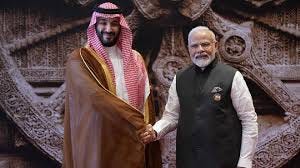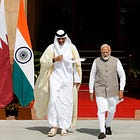Indo-Gulf Focus: Saudi Reaffirms $100 Billion Pledge, Deepening BRICS Ties
The commitments serve to fortify West and South Asia against forthcoming trade challenges.
In a recent Arab News interview, Indian Prime Minister Narendra Modi confirmed that India and Saudi Arabia are deepening their economic partnership through discussions on joint projects in refineries, petrochemicals, and a new plant. The two nations are also exploring the feasibility of electric grid connectivity, building on Saudi’s $100 billion investment pledge to India from 2019. These developments, which gained momentum during Modi’s visit to the Kingdom in April, reinforce India’s integral role in the India-Middle East-Europe Economic Corridor. They also align with the Gulf’s broader focus on diversifying geopolitical partnerships—most recently exemplified by Qatar—as well as Riyadh’s pivot eastwards.
Saudi Arabia’s Economy-First Strategy Amid Trump’s America-First
The accelerated push for Indo-Gulf economic integration appears to be a strategic response to the unpredictability of US President Donald Trump’s foreign policy, particularly his ‘America First’ foreign policy. Gulf nations, led by Saudi Arabia, are balancing relations with Washington, Beijing, and New Delhi to insulate their economies from global shocks. A cornerstone of this strategy is the fortification of supply chains and logistics networks. For instance, Saudi Cargo’s 2024 Memorandum of Understanding with China Henan Aviation Group Corporation (CHAGC) establishes an air bridge to optimise cargo flows and reduce transit times, enhancing Riyadh’s role as a global logistics hub. Similarly, Saudi’s pragmatic investment in China’s AI pioneer DeepSeek earlier this year, alongside its reinvigorated $100 billion pledge to India, reflects a diversified approach to economic resilience. These initiatives, underpinned by Vision 2030, position the Kingdom to navigate an increasingly volatile global landscape while deepening ties with strategic partners like India.
Modi and MBS: Reshaping Indo-Saudi Ties
Over the past decade, the parallel ascensions of Prime Minister Narendra Modi and Crown Prince Mohammed bin Salman (MBS) have catalysed a transformation in Indo-Saudi relations. Modi’s proactive diplomacy, including visits to Riyadh in 2016 and 2019, has elevated bilateral ties to a strategic partnership, formalised through the India-Saudi Strategic Partnership Council (SPC) in 2019. These concerted efforts have driven record-high bilateral trade which has positioned India as the Kingdom’s second largest trade partner, after China. Other milestones include increasing India’s annual Hajj quota as well as Saudi’s $100 billion investment pledge in 2019.
While the investment pledge was not bound by a specific timeline, actual inflows have reportedly fallen short of the stated figure, facing hindrances in sectors such as oil refining. During Prime Minister Modi’s April visit to Saudi Arabia, both leaders reaffirmed their desire to expedite these investments and strengthen economic cooperation. As such, the visit saw the signing of eight memoranda of understanding, spanning space, renewable energy, and digitalisation. This variety reflects Riyadh’s desire to expand economic cooperation beyond oil and gas, which has long characterised the Indo-Gulf relationship.
Towards BRICS?
The Gulf’s prioritisation of economic integration over regional geopolitical or ideological disputes is most evident in relation to Kashmir. Saudi Arabia has consistently supported India on the issue, framing it as an internal matter for New Delhi while distancing itself from Pakistan’s stance in the broader conflict. Similarly, Qatar’s condemnation of the recent militant attack in Jammu and Kashmir, along with its expression of solidarity in combating terrorism, further underscores this trend.
As such, Riyadh’s push for expedited Indo-Saudi cooperation signals a broader move towards BRICS. Although the Kingdom has yet to join the bloc, discussions have been ongoing and are expected to intensify amid shifting global dynamics. Both Saudi Arabia and India are balanced actors who have maintained neutrality in broader global conflicts, such as the Russia-Ukraine war. Their commitment not only to expanding cooperation but also to accelerating existing pledges serves to fortify West and South Asia against forthcoming trade challenges.





